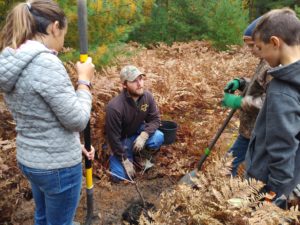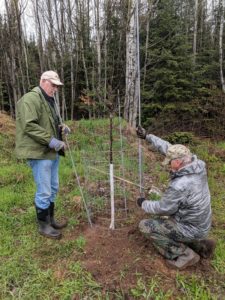Tree Planting Makes an Impact
Happy Arbor Day! Today marks the 135th anniversary of Arbor Day in Michigan. In 1885, the Michigan Legislature resolved, “that the Governor is hereby requested to call the attention of the people of the state to the importance of planting trees for ornament and by naming a day upon which the work shall be given special attention, to be known as Arbor Day.”
Until 1965, the Upper and Lower Peninsulas had separate Arbor Days in the spring because of the difference in weather conditions for tree planting. Governor George Romney proclaimed an Arbor Week for the last week in April 1966. In his proclamation, Governor Romney broke with the traditional one day “Because of the increased interest in, and the importance of the statewide ‘Keep Michigan Beautiful’ program, one or two days do not afford enough time and opportunity for the full and proper observance of Arbor Day.

At MUCC, planting trees is a big part of the habitat improvement projects our On the Ground program conducts. We work with DNR biologists from around the state planting many varieties of trees to benefit wildlife. We plant mast-producing trees to provide food for wildlife. We plant spruces and pines to provide cover for wildlife. We even plant many shrubs to provide cover and food.
During the 2019 field season, MUCC and our volunteers planted 4,570 native trees and shrubs. We planted oak trees in the Barry State Game Area. We visited the thumb and planted shrubs in Elmwood State Game Area. We headed northwest to the Traverse City State Forest and planted trees there, and we capped the planting season off with a trip to the Upper Peninsula to plant trees on public land outside of Gwinn.
The benefits these trees will provide over the next several decades are immense for wildlife, people and our planet. On this Arbor Day be sure to take a moment to admire a tree or two in your life.

A couple more fun facts on Trees:
One acre of forest absorbs six tons of carbon dioxide and puts out four tons of oxygen. This is enough to meet the annual needs of 18 people. U.S. Department of Agriculture
The planting of trees means improved water quality, resulting in less runoff and erosion. This allows more recharging of the groundwater supply. Wooded areas help prevent the transport of sediment and chemicals into streams. USDA Forest Service
Adapted from A Brief History of Arbor Day, The National Arbor Day Foundation and Michigan Arbor Day Alliance
The post Tree Planting Makes an Impact appeared first on Michigan United Conservation Clubs.
Recent Posts



